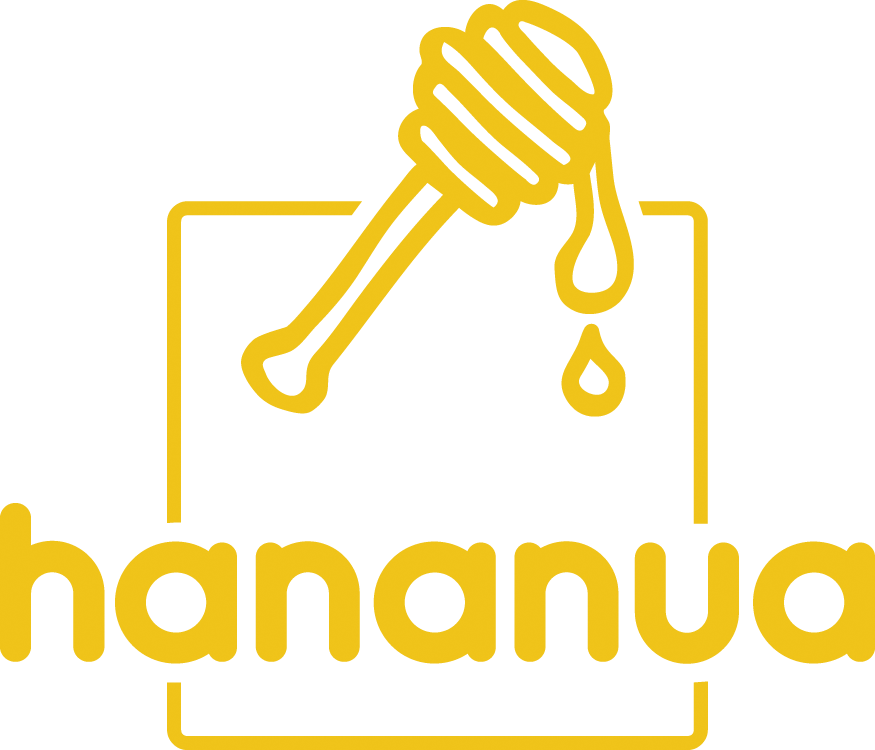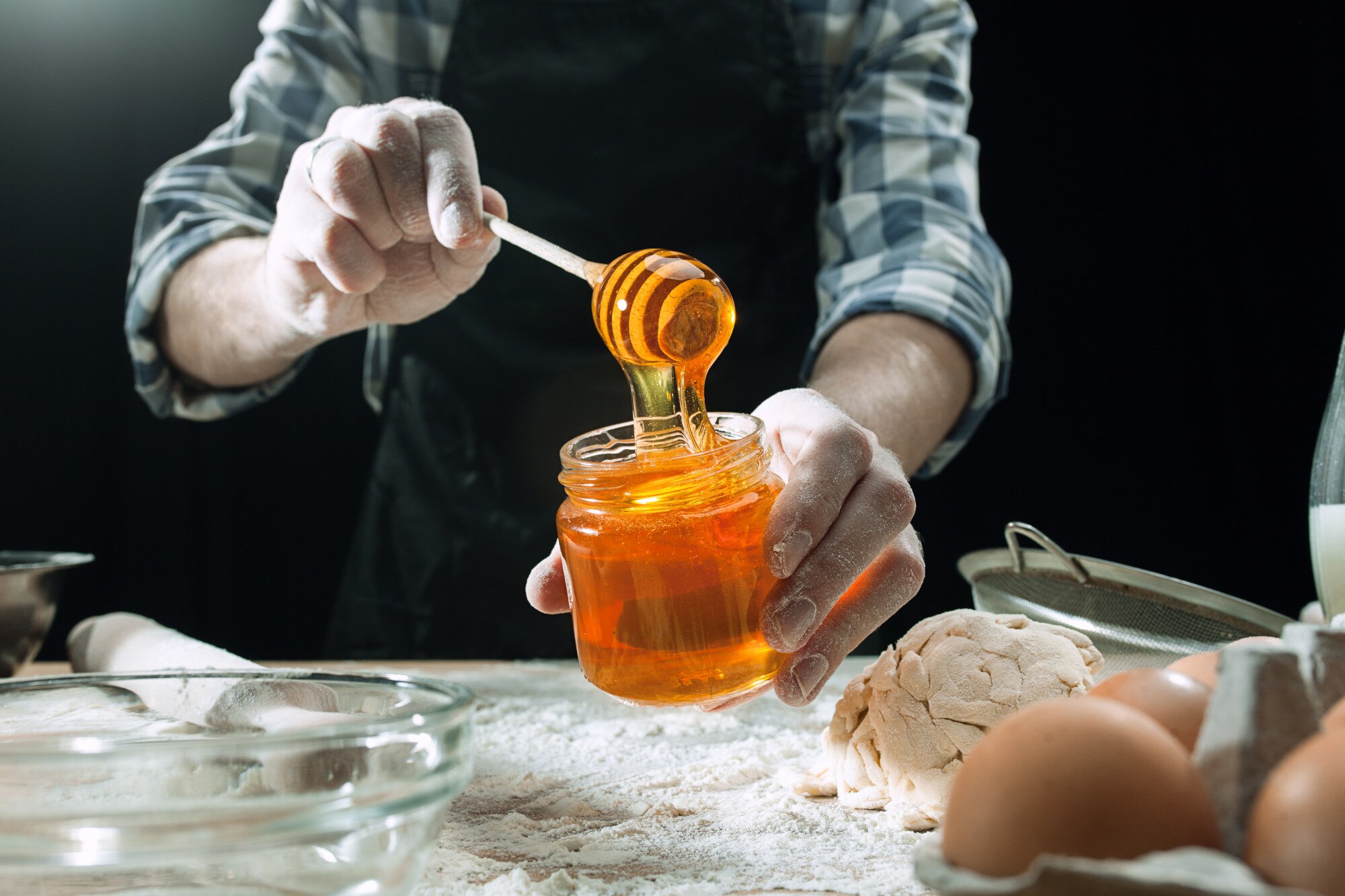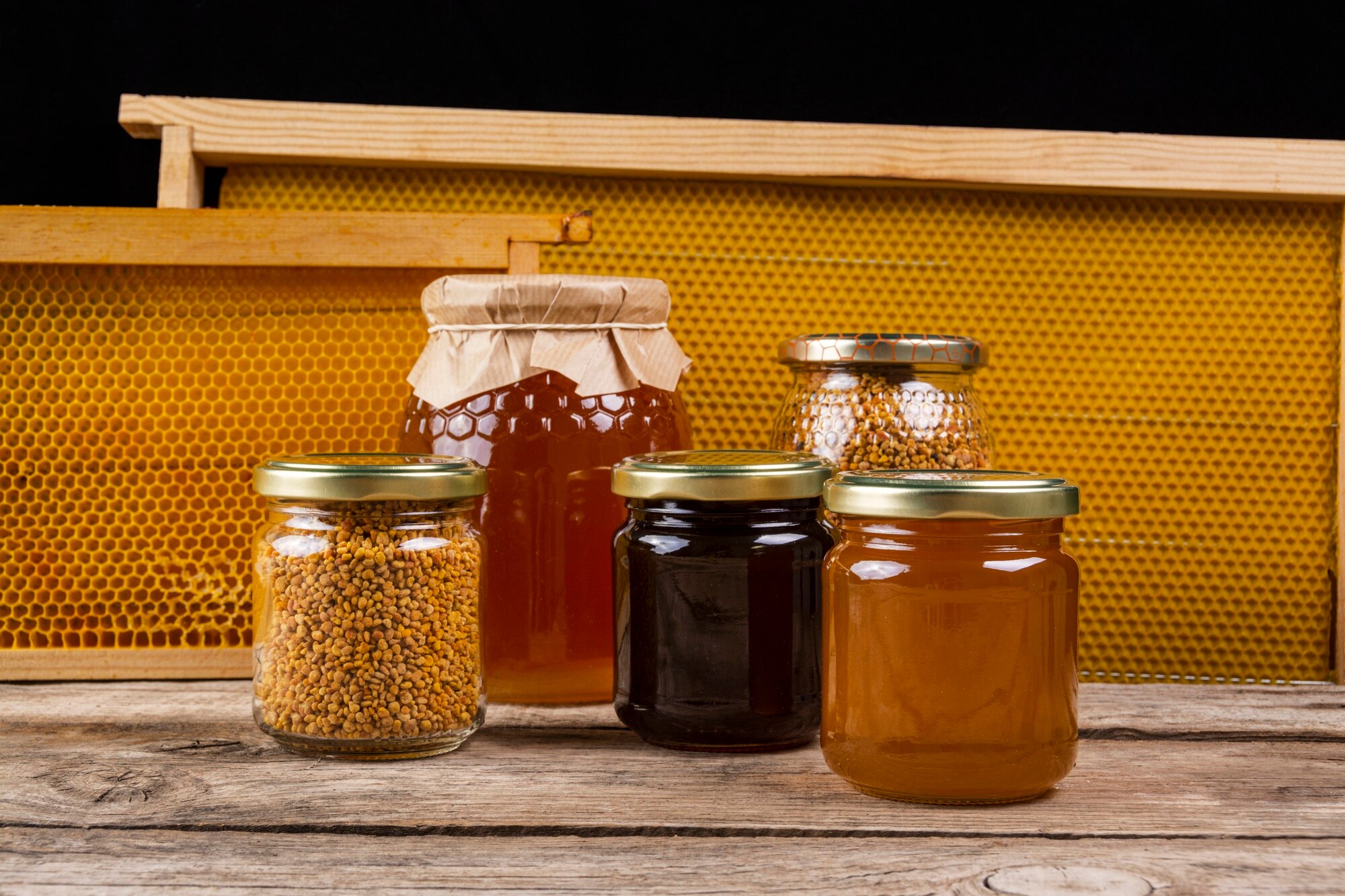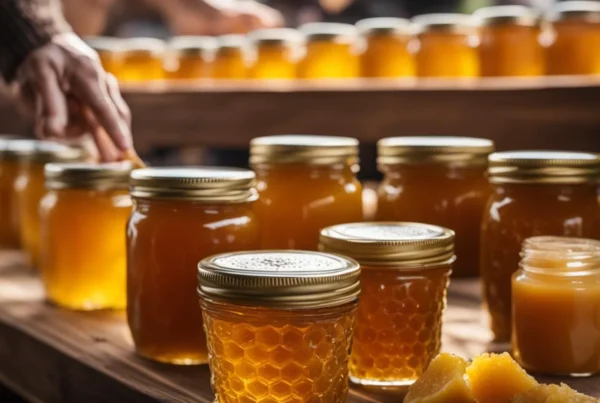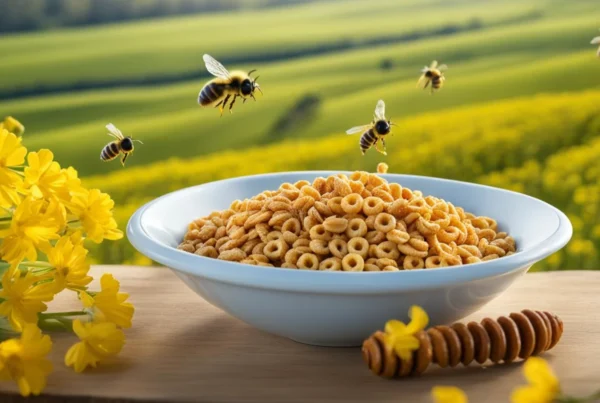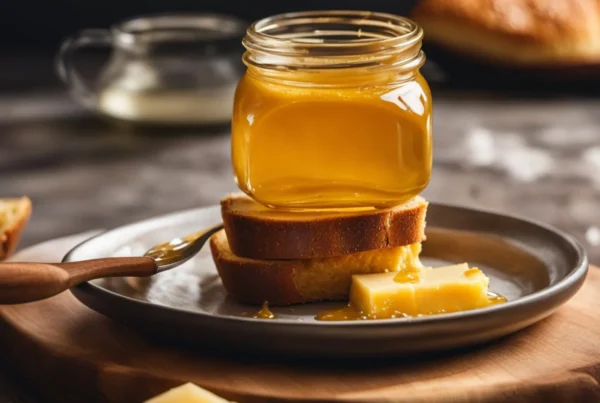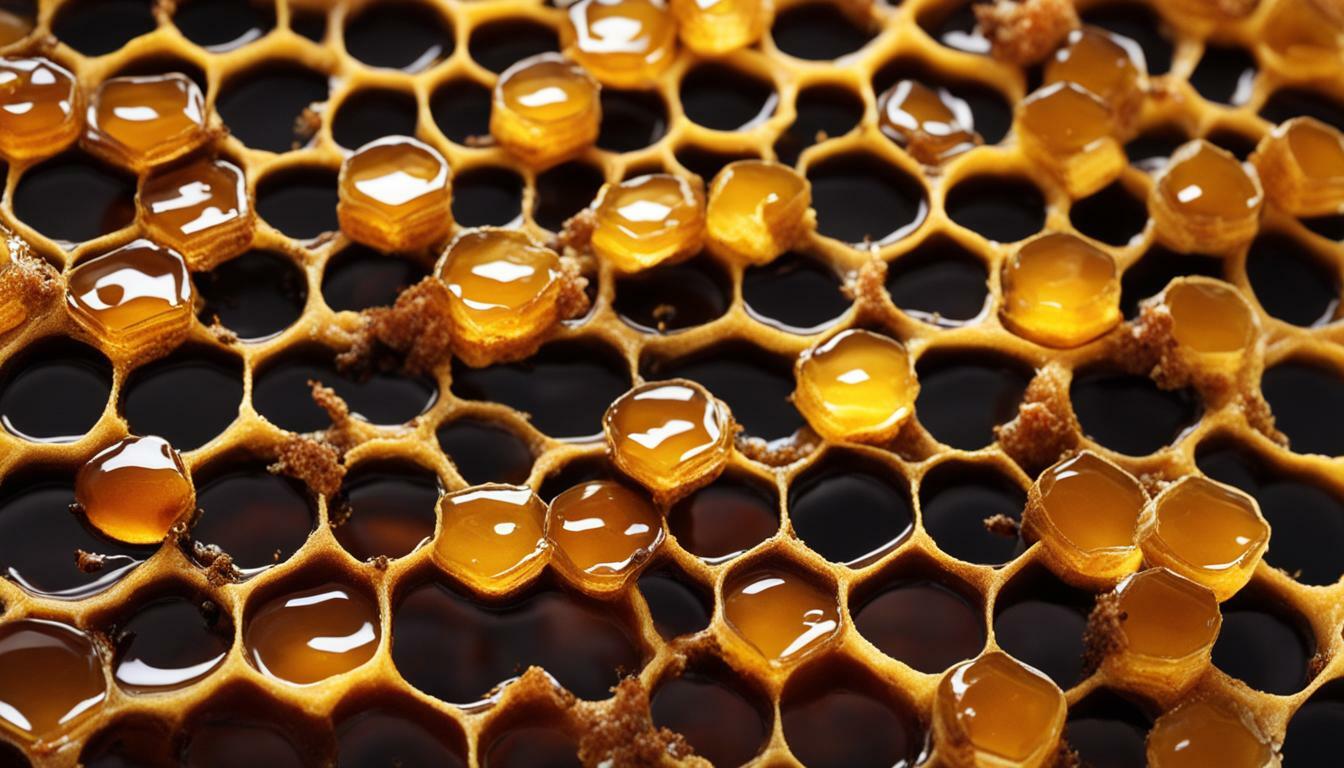
If you’re looking for a natural, unprocessed sweetener, unpasteurized honey might just be the perfect choice for you. Unlike processed honey, unpasteurized honey is packed with beneficial enzymes, antioxidants, and nutrients that make it a healthier alternative. In this article, we’ll dive into the world of unpasteurized honey and explore its numerous benefits.
Key Takeaways
- Unpasteurized honey is a natural, unprocessed sweetener that offers various health benefits.
- Compared to processed honey, unpasteurized honey is rich in enzymes, antioxidants, and nutrients that are beneficial to your overall well-being.
- Unpasteurized honey may have potential antibacterial and antiviral properties that make it a preferred choice for many.
- Local unpasteurized honey may help relieve allergy symptoms and build immunity.
- Choosing organic unpasteurized honey can ensure you are getting a reliable and sustainable source of this natural sweetener.
What is Unpasteurized Honey?
Unpasteurized honey, also known as raw honey, is a type of honey that has not been heat-treated or pasteurized. Unlike processed honey, raw honey retains all its natural enzymes, antioxidants and health-promoting properties, which are destroyed during the pasteurization process.
Raw honey has a thick consistency and a unique, complex flavor profile that varies depending on the region and type of flowers the bees collect nectar from. Additionally, raw honey is known for its natural antibacterial properties, making it a popular item in both the culinary and medicinal world.
It is important to note that unpasteurized honey may contain small amounts of pollen, propolis, and beeswax, which are safe to consume but may cause allergic reactions in some individuals.
The Health Benefits of Unpasteurized Honey
Unpasteurized honey, also known as raw honey, is a natural sweetener that offers a range of potential health benefits. Unlike processed honey, unpasteurized honey is not heated or filtered, preserving the natural enzymes, antioxidants, and nutrients. Here are some of the potential health benefits of consuming unpasteurized honey:
Antibacterial and Antiviral Properties
Raw honey contains hydrogen peroxide, which has antibacterial properties that may help prevent infections. It also contains phytochemicals and antioxidants that may have antiviral properties, potentially helping to fight off colds, flu, and other viruses.
Nutrition
Unlike processed honey, which often has added sugars, unpasteurized honey is a natural source of carbohydrates, providing energy and fuel for the body. It also contains vitamins, minerals, and antioxidants, including iron, zinc, potassium, calcium, and magnesium.
Keep in mind that although unpasteurized honey is a source of nutrition, it should not be relied on as a sole source of nutrients.
Wound Healing
Raw honey has been used for centuries as a natural remedy for wound healing. Its antibacterial and anti-inflammatory properties may help prevent infections and reduce swelling, while its high sugar content can create a protective barrier against bacteria.
Anti-inflammatory Properties
Unpasteurized honey contains antioxidants that may have anti-inflammatory properties, potentially helping to reduce inflammation in the body. Inflammation is often associated with chronic diseases such as arthritis, heart disease, and cancer, so consuming foods with anti-inflammatory properties may be beneficial.
Allergy Relief
Some people believe that consuming local unpasteurized honey can help reduce allergy symptoms, such as sneezing and runny nose. The theory is that eating small amounts of local pollen from the honey can build immunity and reduce allergic reactions.
However, there is a lack of scientific evidence to support this theory and it is not recommended as a sole treatment for allergies.
Overall, unpasteurized honey offers potential health benefits and can be a sweet addition to a balanced diet. It is important to note that infants under one year old should not consume unpasteurized honey due to the potential risk of botulism. Additionally, those with allergies to bee pollen or honey should avoid consuming unpasteurized honey.
Unpasteurized Honey for Allergies
If you suffer from allergies, you might have heard that unpasteurized honey can help alleviate symptoms. While scientific evidence is limited, many people swear by this natural remedy.
The theory behind using unpasteurized honey for allergies is that it contains small amounts of pollen from local plants. By ingesting this pollen, the body builds immunity to the allergens and eventually reduces the allergic reaction.
It’s important to note that not all unpasteurized honey will have this effect. Look for honey sourced from your local area, as it will contain pollen specific to your allergens. Additionally, unpasteurized honey should not be given to children under one year of age, as it may carry the risk of botulism.
How to Use Unpasteurized Honey for Allergies
If you want to try using unpasteurized honey for allergies, start by consuming small amounts and gradually increasing over time. A common method is to take a teaspoon of honey daily, either by itself or mixed into warm water or tea.
You can also incorporate unpasteurized honey into your diet by using it as a natural sweetener in recipes or spreading it on toast or crackers.
While unpasteurized honey may provide relief for some allergy sufferers, it’s important to consult with a healthcare professional before using it as a treatment method. Additionally, unpasteurized honey should not be used as a substitute for prescribed medication.
Understanding the Differences between Pasteurized and Unpasteurized Honey
When it comes to honey, not all types are created equal. One of the significant distinctions among different forms of honey is whether they have undergone pasteurization or not.
| Pasteurized Honey | Unpasteurized Honey |
|---|---|
| Pasteurized honey is processed and heated to high temperatures to kill off any potential bacteria and prevent fermentation. The heating process changes the honey’s texture, taste, and color, and it may remove some of the essential nutrients and enzymes naturally found in raw honey. | Unpasteurized honey is raw, unprocessed honey, straight from the hive and contains all the enzymes, pollen, and antioxidants naturally present in honey. The flavor and texture can vary, depending on the source of the honey. |
While pasteurization has its benefits, such as extending honey’s shelf life, it can reduce or eliminate some of the natural health benefits of raw, unpasteurized honey. Because of this, some people prefer to consume unpasteurized honey when possible.
Another difference between the two types of honey is their appearance, with unpasteurized honey often appearing cloudier or thicker than pasteurized honey. This is due to the presence of pollen and other natural substances that are removed during the pasteurization process.
It’s worth noting that unpasteurized honey is not recommended for infants under 12 months old or for people with weakened immune systems, as there is a risk of bacterial contamination. However, for most people, unpasteurized honey offers a range of potential health benefits that make it a preferred choice over pasteurized alternatives.
Where to Buy Unpasteurized Honey
When it comes to purchasing unpasteurized honey, it is important to find a reliable source that provides high-quality organic honey. Here are some options for where to buy unpasteurized honey:
| Retailers | Description |
|---|---|
| Farmers Markets | Local farmers markets offer a great opportunity to purchase unpasteurized honey directly from beekeepers. This ensures that the honey is fresh and minimally processed. |
| Online Stores | There are numerous online retailers that specialize in organic and unpasteurized honey. Ensure that you are buying from a reputable source and read customer reviews before making a purchase. |
| Health Food Stores | Many health food stores carry a selection of unpasteurized honey brands. Check the label to ensure that the honey is organic and unpasteurized. |
When purchasing unpasteurized honey, look for signs that indicate the honey is pure and unprocessed. These may include small particles of honeycomb, a cloudy appearance, and a thick consistency.
Choosing to buy organic unpasteurized honey not only ensures that you are getting a natural and flavorful sweetener, but also supports local beekeepers and promotes sustainable agriculture.
Incorporating Unpasteurized Honey into Your Diet
Unpasteurized honey is a versatile and delicious natural sweetener that can be easily incorporated into your diet. Here are some ways to enjoy this healthy ingredient:
1. Sweeten Beverages
Unpasteurized honey is a great addition to a variety of beverages, including tea, coffee, and smoothies. Its unique flavor profile adds a touch of sweetness without overpowering the taste of the drink.
2. Use in Cooking and Baking
Unpasteurized honey can be used in cooking and baking in place of processed sugars. It adds a depth of flavor to dishes and also helps to keep them moist and tender.
3. Spread on Toast
Enjoy unpasteurized honey by spreading it on a piece of toast or adding it to a sandwich. Its natural sweetness pairs well with savory ingredients like cheese and meats.
4. Mix with Yogurt and Fruit
Unpasteurized honey adds a touch of sweetness and flavor to plain yogurt and fresh fruit. Mix it with your favorite berries or sliced fruit for a healthy and delicious snack.
With its numerous health benefits and versatility, unpasteurized honey is a great ingredient to have in your pantry. Experiment with different ways to use it and enjoy the natural sweetness and unique flavor it provides.
Safety Precautions when Using Unpasteurized Honey
While unpasteurized honey offers many benefits, it’s important to handle and consume it safely. Here are some safety precautions to keep in mind:
- Avoid giving unpasteurized honey to infants: Infants under one year old are advised not to consume unpasteurized honey due to the risk of botulism.
- Store properly: Keep unpasteurized honey in a sealed container at room temperature. Avoid storing it in the refrigerator as this can cause crystallization.
- Inspect for quality: Before consuming, inspect the honey for any signs of mold or fermentation. Discard if you notice any unusual color, odor, or taste.
- Ensure proper heating: If using unpasteurized honey in cooking or baking, ensure that it is heated to at least 145°F (63°C) to eliminate any potential bacteria.
By following these safety precautions, you can safely enjoy the benefits of unpasteurized honey.
Unpasteurized Honey and Sustainability
Unpasteurized honey is not only a delicious and nutritious sweetener but also an environmentally sustainable choice. Supporting local beekeepers who produce unpasteurized honey can help protect natural habitats and promote biodiversity. By choosing unpasteurized honey, you are also supporting a more ethical and natural approach to honey production.
Industrial-scale honey production often involves mass-produced monoculture crops that replace natural habitats, eliminate important pollinators, and contribute to the decline of bee populations. In contrast, local beekeepers who produce unpasteurized honey often maintain smaller, more diverse, and pesticide-free farms that provide food and shelter for bees and other pollinators.
| Benefits of Supporting Local Beekeepers |
|---|
| Environmental sustainability: Supporting local beekeepers who promote sustainable farm management practices, protect natural habitats, and contribute to biodiversity. |
| Ethical and humane beekeeping practices: Supporting beekeepers who prioritize the well-being of their bees, such as allowing them to forage freely and avoiding overuse of pesticides. |
| Community support: Supporting local economies, small businesses, and farmers who rely on the production of unpasteurized honey for their livelihood. |
Not only does unpasteurized honey promote sustainability, but it also offers unique nutritional benefits compared to processed honey. Unpasteurized honey has a higher concentration of antioxidants, vitamins, and minerals since they remain unaltered during the production process. Moreover, consuming unpasteurized honey helps maintain the diversity and health of the local bee population, which is essential for a healthy ecosystem.
In summary, choosing unpasteurized honey not only supports your health but also the environment and local communities. By making the switch to unpasteurized honey, you can enjoy a natural and sustainable alternative to processed sweeteners while also promoting the well-being of bees and the planet.
The History and Cultural Significance of Unpasteurized Honey
Unpasteurized honey has been valued for its taste and health benefits for thousands of years. Historically, it was used as a natural sweetener and a medicinal remedy in different cultures worldwide.
The use of unpasteurized honey dates back to ancient times when it was used by the Greeks, Romans, and Egyptians. The Greeks believed that unpasteurized honey was a gift from the gods and often used it as a sacrificial offering. They also recognized its nutritional value and used it to treat a range of ailments, from wounds to indigestion.
The Romans valued unpasteurized honey so much that they often used it as a form of currency. It was also used as a natural sweetener in their cuisine and as a medicinal remedy for a range of ailments, including sore throats and coughs.
The Egyptians used unpasteurized honey as a natural sweetener and a source of energy. They also recognized its antimicrobial and anti-inflammatory properties and used it to treat infections and wounds.
Throughout history, unpasteurized honey has played an important cultural role. In some cultures, it was used as a symbol of wealth and prosperity, while in others, it was used in religious ceremonies and celebrations.
Today, unpasteurized honey continues to be a popular natural sweetener and a valued source of nutrition. Its unique flavor profile and health benefits make it a popular ingredient in cuisines around the world.
Conclusion
Unpasteurized honey is a truly unique and beneficial natural sweetener. It offers a range of advantages over processed alternatives, making it a preferred choice for many. From its health-promoting properties to its delicious flavor profile, there are numerous reasons to incorporate this raw honey into your diet.
If you’re looking for unpasteurized honey, there are various sources to choose from. Local farmers’ markets and organic food stores are great places to start. You can also find organic unpasteurized honey online from reliable sources.
When consuming unpasteurized honey, it’s important to do so safely. Always store it properly and avoid giving it to infants under one year of age. Additionally, while unpasteurized honey may offer potential allergy relief, it’s important to consult with a healthcare provider before incorporating it into your allergy treatment plan.
Whether you’re using unpasteurized honey as a natural sweetener or for its health benefits, this raw honey is a great addition to any pantry. Try it in your favorite recipes or simply enjoy it on its own – the possibilities are endless.
FAQ
What is unpasteurized honey?
Unpasteurized honey refers to honey that has not undergone the process of pasteurization. It is raw and unprocessed, retaining its natural enzymes, antioxidants, and health-promoting properties.
What are the health benefits of unpasteurized honey?
Unpasteurized honey offers various health benefits. It may have potential antibacterial and antiviral properties, provide essential nutrients, and support overall well-being.
Can unpasteurized honey help with allergies?
Unpasteurized honey is believed to help relieve allergy symptoms. The theory is that consuming local unpasteurized honey can build immunity and reduce allergic reactions.
What are the differences between pasteurized and unpasteurized honey?
Pasteurized honey undergoes a heating process that can affect its nutritional content. Unpasteurized honey, on the other hand, is raw and maintains its natural qualities. Many people prefer the unprocessed nature of unpasteurized honey.
Where can I buy unpasteurized honey?
You can purchase unpasteurized honey from various sources. Look for organic options at local farmers’ markets, specialty stores, or online retailers. Supporting local beekeepers is also a great way to find high-quality unpasteurized honey.
How can I incorporate unpasteurized honey into my diet?
Unpasteurized honey is versatile and can be used in various ways. You can sweeten beverages, use it in cooking and baking, drizzle it over yogurt or oatmeal, or enjoy it spread on toast.
Are there any safety precautions when using unpasteurized honey?
It is important to handle and consume unpasteurized honey with care. Avoid giving unpasteurized honey to infants under one year old due to the risk of botulism. Store it properly in a cool, dry place and discard if it changes in color, smell, or consistency.
How does unpasteurized honey contribute to sustainability?
Choosing unpasteurized honey can support environmental sustainability by promoting local beekeeping practices. It helps maintain the population of pollinators while ensuring the availability of this natural sweetener.
What is the history and cultural significance of unpasteurized honey?
Unpasteurized honey has a rich historical and cultural significance. It has been used in various cultures throughout history for its medicinal properties, culinary uses, and as a symbol of prosperity and sweetness.
